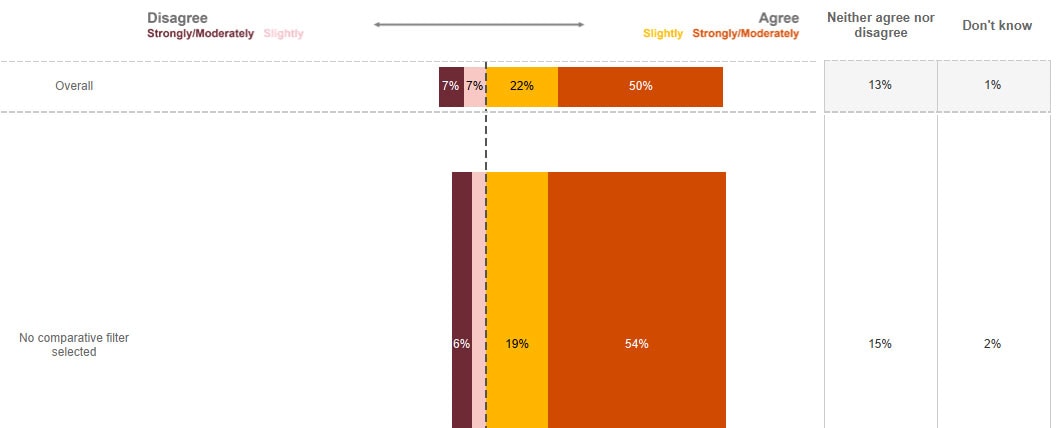
The 2023 Luxembourg outlook on PwC's Hopes & Fears survey
Each year, PwC runs a global survey in order to take the pulse of the workforce of 27 industries across 46 countries. This year, the survey was taken by 53,912 workers, 107 of whom work in Luxembourg. It was conducted in April 2023 with one clear objective: to better understand the attitudes and behaviours of employees. The results provide invaluable insight.
Make sure you keep an eye out all year long for thought leadership and deep dives into this treasure trove of data, on this page and across social media.
This year’s survey showed that six out of 10 employees are happy with their jobs and feel like they can be themselves at work. Reason enough to celebrate? Not entirely. With almost one in five respondents facing financial difficulties, 30% not being able to put money aside, and 22% holding down several jobs, what we observe is that the financial crisis is starting to put a strain on more and more households. Meanwhile, gender inequality remains a challenge, with women landing fewer top jobs than men and being less optimistic about the future of their career.
As we dig deeper into the Luxembourg results of our worldwide survey, we can look for answers to questions such as: Do employees trust their employer? Do they feel like their employer is doing enough to tackle climate change? How do they envision their role within the company? Do they feel valued for their skills or are they afraid they will lose their job to AI? Let’s see what they have to say.
Hopes and Fears 2023

Workforce Environment
When arriving in a new company, most employees (60%) hope to acquire new skills. They seek productive feedback (59%), proactively try to solve the problems they encounter (65%), bring innovative ideas to the table (52%), and are willing to take on extra responsibilities (53%). All this demonstrates how most employees are willing to go the extra mile, and how employers can count on them to grow professionally and come forward when necessary. Most employees would recommend their company as a good place to work (57%), which also seems to show that they believe in what they do.
My actions/behaviours at work are aligned with my company values and direction

Workforce Skills
The two main elements employers look at in a CV are professional background and skills. While three in five respondents consider both aspects to be equally valued, the remaining % feel like employers still focus on their job history too much, and not enough on their skills. In fact, half of the respondents believe their formal qualifications are not relevant to their current job.
When it comes to the skills they value the most, a short majority of employees (66%) tend to consider critical thinking as the important one for the next five years of their career. But only half of them are confident that their employers will provide them with the tools, resources and opportunities to further develop them.

Trust
Can managers be transparent in their decision-making process while lacking honesty and integrity in their interactions with their teams? It would seem so, based on what came out of our survey results. While only one in four of respondents think their managers are not sufficiently open and transparent, the proportions increase when it comes to lack of honesty and integrity (three out of five) and fair and equitable treatment (32%).
My manager acts with honesty and integrity in all of their interactions with my team

Climate Change
We already know how much the general public cares about the contribution of businesses to climate change. In a previous study focusing on the perception of the importance of ESG, PwC found that 83% of consumers believe companies should be actively promoting ESG best practices. What about Luxembourg’s employers: do they actually act on climate change? Some 46% of respondents seem to think so, even though only 25% think enough is being done.

Artificial intelligence (AI)
With AI taking business practices by storm, it’s always fascinating to see how employees and managers anticipate the impact of such innovations on their daily jobs. Does the workforce believe AI will change the way we work? 34% of respondents think so. Do they see this as a step forward? This is where things get a little worrying for businesses investing heavily in AI: while solution providers argue that AI will not replace human work but make it more efficient, only 30% of respondents who believe AI will impact their job consider that it will increase their productivity and efficiency.
The idea that AI is not meant to replace people, on the other hand, seems well anchored in people’s minds. Among the people who believe AI will impact their job, only one in 10 think it will eventually replace them.
What impact, if any, do you expect AI to have on your career in the next five years?
Stay tuned as we continue to delve into the fascinating insights uncovered by this year's Hopes & Fears survey. Whether you’re seeking to understand the evolving aspirations that shape our world or eager to address the pressing concerns that demand attention, we promise to deliver captivating content that ignites meaningful discussions and sparks innovative ideas. Be sure to keep an eye out for our upcoming publications, as we explore together the intricate tapestry of hopes, fears, and possibilities that shape our collective future.
About the Survey
Each year, PwC organises a major survey to take the pulse of employees across 46 countries. The 15-minute survey has been taken by 53,912 workers this year. It was conducted in April 2023 with one objective: Better understanding the attitudes and behaviours of employees across 27 industries.
Want to learn more about our findings on the international workforce?
Read PwC’s Global Hopes & Fears report now!
Contact us
Vinciane Istace
Advisory Partner, People Experience and Change Leader | People Process Outsourcing Leader, PwC Luxembourg
Tel: +352 621 332 112








